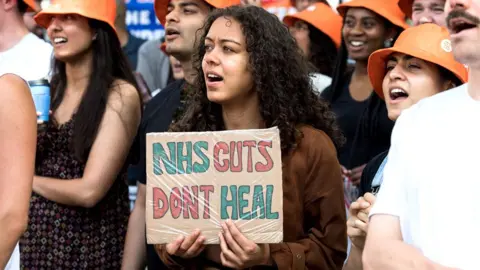BBC News
Political reporter
Chief Political Correspondent
 Getty Images
Getty ImagesThe government has ruled out any extra cash for pay rises after review bodies recommended new deals for teachers and NHS staff above the amount budgeted for by ministers, Downing Street has said.
The pay review body for teachers in England has recommended a pay rise of about 4% this year, while its NHS equivalent has recommended about 3%, according to figures first reported by The Times.
Both figures are higher than the 2.8% the government had budgeted for in their proposals to the pay bodies, and are likely to place further strain on public finances.
Prime Minister Sir Keir Starmer said the government would look at the pay proposals “and respond in due course”.
Last year the government accepted the recommendations of the pay review bodies in full, handing workers raises of between 4.75% to 6% – a move that ended widespread industrial action.
Sir Keir has cited ending strikes as a key part of his plan to improve the NHS, arguing it is one of the reasons waiting lists have been falling for the past six months.
The prime minister told the BBC: “I think what we’ve proved is by working with staff, we get better results.
“As for the pay recommendations, we will look at them and we will respond in due course,” Sir Keir added.
The prime minister’s official spokesman later added there would be “no additional funding” for pay deals “if recommended awards exceed what departments can afford” – suggesting cuts and efficiency savings would be needed.
The government could reject the pay recommendations and stick to 2.8%.
But it is more likely that ministers say the higher pay will have to be funded by existing budgets and efficiency savings.
That would set ministers on a collision course with trade unions and – government insiders privately concede – make a new wave of strikes possible.
Teaching unions NASUWT and National Education Union, which together represent the bulk of England’s teaching workforce, have already threatened strikes if pay rises trigger cuts or layoffs.
National Education Union general secretary Daniel Kebede said: “They need to ensure the pay award is above inflation, that it takes steps to address the crisis in recruitment and retention, but most of all that it is fully funded.”
The British Medical Association (BMA) has previously said the government’s approach “indicates a poor grasp of the unresolved issues from two years of industrial action”.
Health Minster Stephen Kinnock told Sky News: “We are all about putting more money into the pockets of working people, but we do also have to ensure that we are balancing the books, and we have got to work in terms of public sector pay within fiscal constraints.
“We will give these recommendations careful consideration.
“But I would, of course, also urge our colleagues in the trade union movement to engage constructively with us and recognise the reality of the financial position.”
Director of the Institute for Fiscal Studies Paul Johnson said the government will face “tough” trade-offs when considering how to award pay.
Chancellor Rachel Reeves has set “very, very tight budgets” so any pay increase risks the government being “forced into tax rises or other spending cuts”, Johnson said.
Speaking on BBC Radio 4’s Today programme, Johnson said: “If you’re increasing pay then you can’t do other things.
“You can’t employ more teachers or open breakfast clubs or have more doctors and nurses.”
Public anger over pay, squeezed public services and potential strikes could play a major role in local elections this week – the government’s first major test since last year’s landslide general election victory.
Sir Keir is spending Monday touring hospitals promoting reforms to the NHS app – which he said will haul the health service out of the “dark ages”, saving it money and cutting waiting lists.
The salaries of NHS staff, as well as other public-sector workers such as police officers, teachers and the members of the armed forces, are recommended by eight pay review bodies (PRBs).
They cover 2.5 million workers – about 45% of public-sector staff – and a pay bill of around £100bn.
The PRBs are made up of economists and experts on human resources, with experience in both the public and private sector and are appointed by the relevant government department.
The independent pay review bodies take overall earnings, both public and private sector, and the forecast rate of inflation into account when they make their recommendations.

#Ministers #face #projected #teacher #NHS #pay #deals
